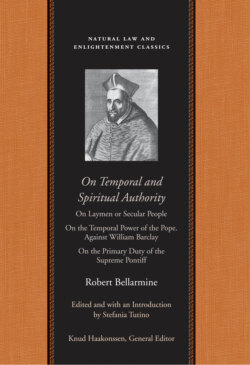Читать книгу On Temporal and Spiritual Authority - Robert Bellarmine - Страница 15
На сайте Литреса книга снята с продажи.
CHAPTER 1 Summary of the entire disputation
ОглавлениеWe have discussed two branches of the Church, the clergymen and the monks, and it remains for us to talk about the third, the laymen or secular people, and at the same time about the branches which are severed from the Church, that is, the heretics, all of which things can be subsumed in a disputation on the political magistrate.
This entire disputation is contained in six questions. First, we must deal with political authority itself, then with its duty in political matters, and third with its duty in matters of religion.
On the first point there are two questions. The first is whether this authority is good and therefore lawful for Christians, and the second whether it can be lost through sin.
On the second point there are two questions. First, on the duty of the magistrate in preserving the commonwealth from the citizens’ wickedness through laws and sentences both civil and penal, that is, whether it is lawful for Christians to make laws, administer justice, and punish the guilty with the sword, which are the acts proper to the magistrate. The second, on the duty of the magistrate in protecting the commonwealth from external enemies, that is, whether it is lawful for Christians to wage wars, and to this we add—almost as a corollary, because of Luther—whether it is lawful to fight against the Turks.1
On the third point there are two further questions. The first is whether the care of religion pertains to the magistrate or whether he can allow everybody to believe what they want. The second question is whether the magistrate must punish the heretics sentenced and condemned by the Church in their writings and in their possessions and in their persons, even to the point of punishing them with death.
